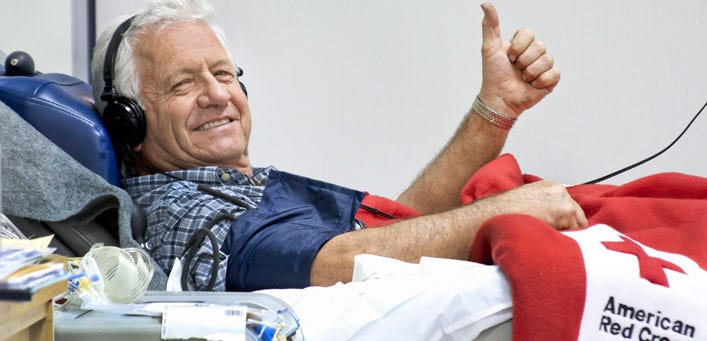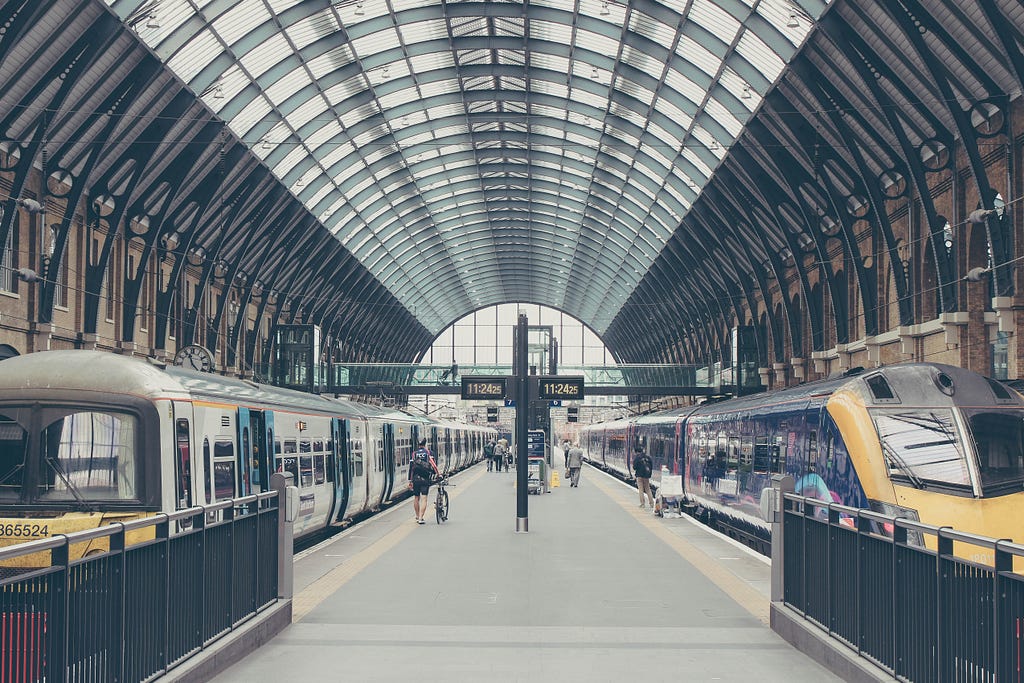Latest news about Bitcoin and all cryptocurrencies. Your daily crypto news habit.
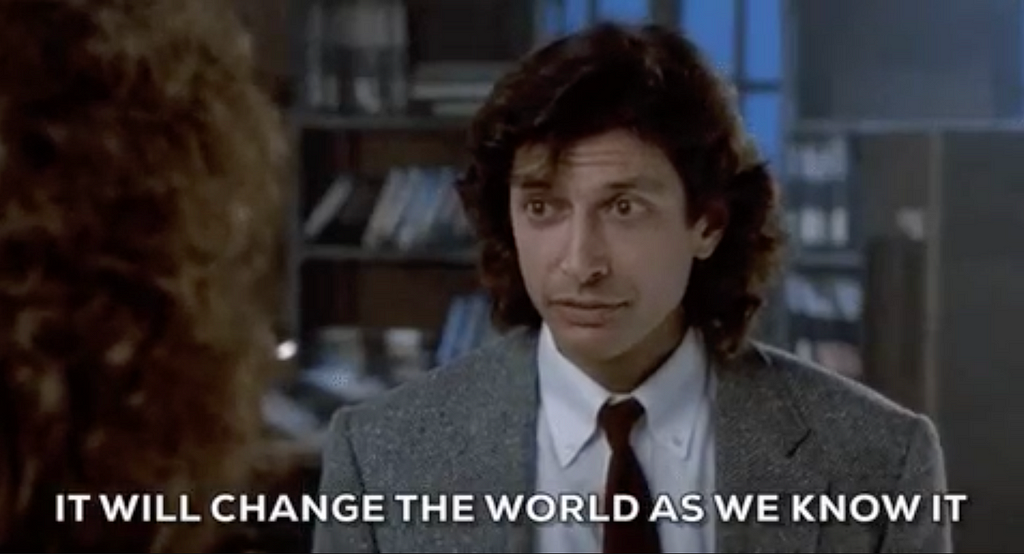
Just want the examples? Scroll down to the chap giving a thumbs up.
For many of us, myself included, blockchain is still in that weird new, exciting, but really poorly understood space. It seems to be a tech-heavy solution looking for a problem and so is still rather gimmicky. We’re waiting for the ‘killer-app’ which helps people understand what it’s actually useful for.
This is perfectly normal. Society takes a while to learn about a new technology, and then how and when to use it. It happened when we learnt how to harness electricity, nuclear energy, computing, mobile phones, and no doubt the spinning Jenny, telephones, and the printing press. This is just how change happens. (I’d really recommend Kuhn for an accessible but rigorous summary on this.)
So at the risk of looking like a complete idiot, I’m going to use this article to outline a few ideas I’ve had over the years and invite comment on their feasibility, because I can’t discern whether they’re ridiculous or brilliant, or perhaps a bit of both. At least they’ll be out of my head and can serve to prompt consideration, innovation, the ridicule they deserve, or education about where the flaws lie. Or maybe someone will read this and drop me a line to we can go change the world.
Firstly, let’s state some assumptions.
It seems to me that one of blockchain’s most interesting uses is as a glorified loyalty card in which you can get points for doing various things. This is great because there are lots of things we do which should get points, but which society currently does not adequately incentivise (or punishes with ‘negative points’). Pollution costs too little and we don’t make the polluter pay enough. Health and public health is another where the ‘reward’ (living longer) is too far away to make our monkey brains take decisions which are good for us in the long run. The current feedback loops are too weak to drive the changes we need, or would like to see.
This is a tragic flaw in the economic and regulatory systems we’ve inherited.
To look at a (technically inaccurate but appropriately) simplified model history:
- we traded locally
- then we needed to get more complex things done so we started to formalise traditional money (£$) to help that
- then we found that there were things (public goods) that we wanted but the free market didn’t provide very well (eg roads were poorly maintained and had highwaymen, education was clearly useful for society but hard for individuals to invest in)
- so we created Government to fill the gap to regulate and use taxes and incentives to nudge and cajole us along towards our shared goals.
That worked very well, and for hundreds of years societies grew more complex, business delivered more and better things to more people, health and education improved, population grew exponentially, and we even left the planet. If we think of civilisation as a series of levels in a game we’re playing together (exist → evolve → communicate → collaborate → grow → maintain, repair & enrich → leave planet → leave solar system → ..?), then generally speaking, humanity deserves a big pat on the back for doing really well at the ‘grow’ level. Our strategy had some very unpleasant abuses, problems, and atrocities and that sucks. But civilisation is still really young and learning and we’re getting considerably better at not making the same mistakes twice.
Now the game has moved on to the next level: maintain, repair and enrich. Or to put it in other terms: ‘how to manage our success without letting our ambition destroying us’. (See also the Drake Equation.)
To do this we need to start thinking about — and measuring things — differently. J.F.Kennedy eloquently touched on this in his famous quote:
Gross National Product counts air pollution and cigarette advertising, and ambulances to clear our highways of carnage. It counts special locks for our doors and the jails for the people who break them. It counts the destruction of the redwood and the loss of our natural wonder in chaotic sprawl. [..] Yet the gross national product does not allow for the health of our children, the quality of their education [..], the intelligence of our public debate or the integrity of our public officials. [..] It measures everything in short, except that which makes life worthwhile. And it can tell us everything about [people] except why we are proud that we are [people].
And for the last few decades we’ve been doing really well at decoupling economic growth from resource consumption as the graph below shows.
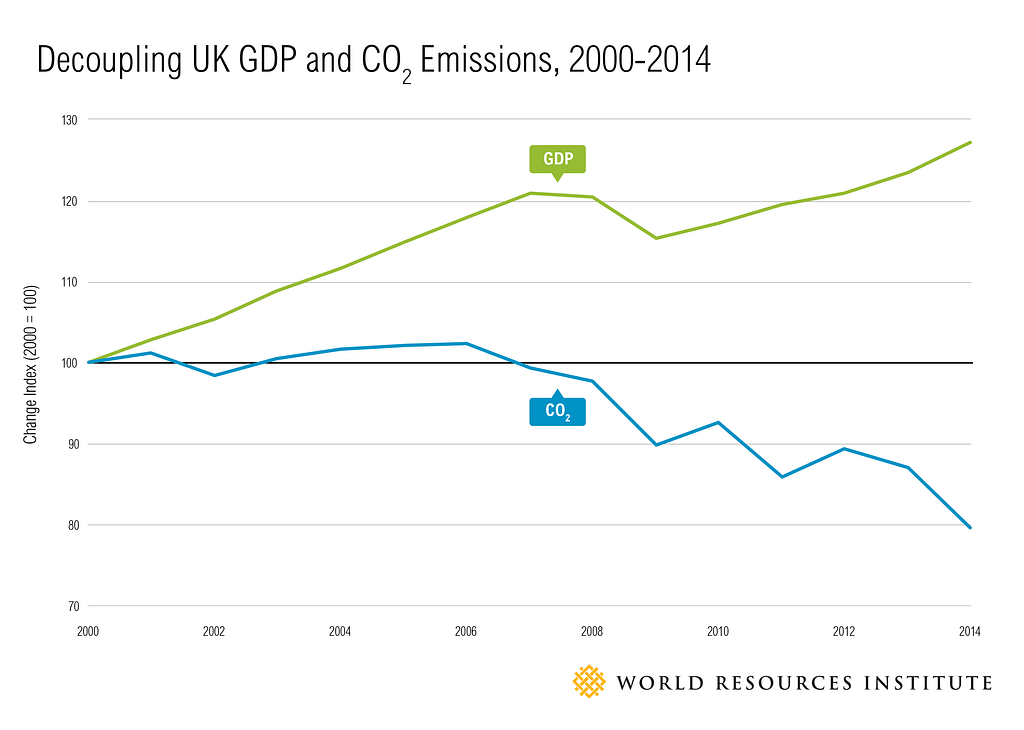 Reducing Carbon Emissions While Growing GDP — World Resources Institute
Reducing Carbon Emissions While Growing GDP — World Resources Institute
But we’re not doing brilliantly at it. Our challenge is to make all the lines in this graph go down and to the right. But right now, they don’t:
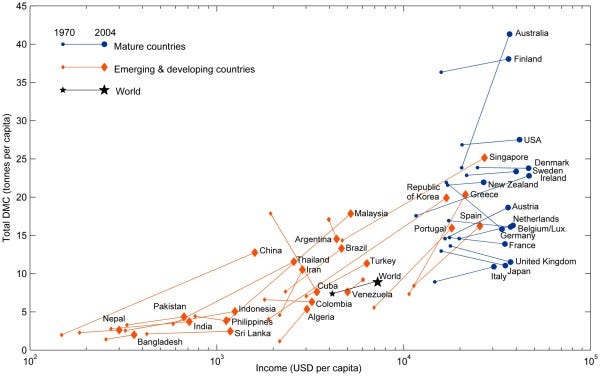 Way to go, Cuba and Germany! — via Cleantechnica
Way to go, Cuba and Germany! — via Cleantechnica
Right now we’re on track to fail this level because we’re well on the way to destroying our life support systems whilst having increasingly meaningless lives. Whoops.
What blockchain does nicely is allow us to reinvent how we think about what money is and does, and what it values and why, and use these new ‘loyalty card’ mechanisms to measure, account, and trade different commodities and values in new ways.
Right, that’s enough rationalisation. On to the hypothetical examples.
(All the names are made up. Things like them may exist, I just don’t know. If they do, please comment with links. Also there are flaws and implementation issues with each — this is just an intro to the ideas — this article is already long enough.)
1. Medicoin
The key to solving a lot of medical problems lies in a better understanding of genetics. The more DNA data we can gather and analyse the more problems we’ll solve.
We’ll be faster and better at finding cures and treatments if we can tie individual DNA to lifestyle and monitor outcomes over time (ie who gets which disease, when, and how their body deals with it and responds to what treatment).
The faster we can do it, the quicker we will reduce the cost of medicine and improve the outcomes.
Iceland is already cracking on with this: 1/3rd of the population has donated their DNA for research. Many papers have already been published based on the data and trials are underway for new Alzheimers treatments. Thanks, Iceland!
But… their data is anonymised, reducing its potential, and people have little incentive to participate.
Meanwhile public health care systems find it harder and harder to pay the bills and run the necessary experiments.
Blockchain to the rescue.
We can make a system so that when you give your DNA you are registered and given 20,000 Medicoins. Your DNA is unique so you can only do this once. This elegantly solves a fairness of allocation problem — it’s not just the rich early investors who benefit, and we all participate equally.
You can use Medicoins just as you would use money. They are stored in your wallet and you spend and transfer them as you wish, for whatever you wish, with whomever you wish.
Every 3 months you are asked a series of quick simple questions about your health. Every time you do, you get an extra 100 Medicoins. This could be done via the app which holds your coins, or a good time to do this, as well as your initial DNA investment, might be when you give blood. Another medical win.
If you like, you can think of this whole thing as being a basic income system, but with a bit of a quid-pro-quo. You get ‘thanked’ in Medicoins just for being a good person who is contributing to the public good.
We can further incentivise it by adding bounty prizes: if your DNA contains a sequence which cures cancer and you’ll get enough points to retire comfortably. You’ll probably also get a lot of friendly postcards from people who don’t die of cancer.
This creates a massive pool of DNA data which generates value in at least three key ways: access to the data can be sold to research organisations; sale of newly discovered treatments generates revenue; and if this were run by a public health care system like the NHS there would be savings on diagnostic and treatment costs.
If we had to fund such a programme using normal £$€ it would be too expensive: the upfront, long term investment would make it unfeasible. £$€ just doesn’t value healthy life adequately well.
“That’s great, but having a pool of data is only part of it. Who would pay for the research and computation to process all the DNA and biomathematics?” I hear you ask.
Well at the moment Bitcoin is churning away billions of CPU hours and energy in completely futile mathematical operations which serve only to justify its own existence. The system which validates the transactions made in Medicoins could be coupled to this very research*. This process could be paid in Medicoins, and the same bounty system could be applied: if you’re running one of the computers which processes the operation that nails Crohn’s Disease, the drinks are on you.
I really like this idea because it deals with fair allocation, provides a basic income model coupled to purposeful civic participation, and makes sure that computational power does something worthwhile. It also gives the possibility of letting you use your DNA as an identifier, and have a more proactive ownership of it — a right which is currently being eroded by promiscuous biotech patents.
We need someone from bioinformatics world to help us structure the problems in a way which makes the suitable for a bite-sized proof-of-work structure.
*CureCoin and FoldingCoin do elements of this, but far from the whole thing.
2. RailCoin
The previous example showed how new Coins can be used to unlock additional investment capability by better valuing future benefits. This example does the same thing, but has a clearer mechanism for returning dividends (benefits) to investors and using them to improve the system.
Let’s do an ICO to buy a rail company and run trains.
In the UK we have a (weird?) system where private companies can win a licence to operate trains on public tracks. Which means that what follows is actually possible.
- Launch an ICO to raise boatloads of money.
- Buy a rail franchise and rolling stock etc.
- Make the service kick-ass with good wifi and plenty of space and coupled with free bike rental etc — all the good innovations you’d expect if you were making a sensible and joined-up transport system.
- Use the RailCoin to give preferential treatment to those who invest in the future of the RailCo.
- Use the personal relationship and incentive mechanisms to optimise the system.
Basically this is cooperatively owned and run rail company, with additional benefits for members.
So let’s say you buy 10,000 RailCoins for the same price as you’d currently pay for a season pass for two years. By being an investor you get 10% off your tickets, get preferential access / speeds on wifi, have a free hot drink on each journey, discounted / extended free periods on bike hire, etc.
Because you have a personal travel wallet holding your RailCoin, and because that’s personalised to you, the RailCo can also start to play with ticket prices in a more agile and intelligent way to work with you to smooth out demand. This is different from current rail travel in that passengers are dealt with as a nameless masses — there’s no capability to engage us individually in the dance of supply and demand.
By having a personal relationship RailCo can tweak incentives: “Hey Jo, it’s raining today so demand is higher because fewer people are cycling. If you can work from home, brave the weather and cycle, or travel after 10am we’ll give you 5 RailCoins to use on any off-peak journey.” Those ‘gift’ RailCoins represent capacity would otherwise go unused, so can be allocated for ‘free’, with the benefit that the services are improved for all users.
For brevity, you can run the rest of this thought experiment yourself: there are lots of variables which can be tuned to dynamically optimise for efficient and sustainable travel.
Don’t worry, I’ll make the next examples shorter. Keep going!
3. BasicIncome / Generational inequality Coin
How about we just give everyone 30,000 BIGICoins each year and.. see what happens?
The key difference between this and all existing universal basic income experiments is that this is new money supply. So it won’t reduce any existing benefits, it sits alongside them. We don’t have to wait for Government to sanction it, it’s not coupled to the national currency, and it can find it’s own value by the trades we make with it.
Lots of people will tell you it’s a terrible idea, but those people also thought that humans would be too dumb to make Wikipedia a success. The Wörgl Experiment worked pretty well doing similar things. The big flaw is how to ensure value is preserved: do coins have to be removed from the system? Are they time limited? I think we should run 100 experiments and find out.
A good way of speeding adoption of things is to tell people they can’t have it. So as a twist, let’s just give it to everyone under 30 (born after 1987). They’ll be more tech savvy so easier to work with, more open to new ideas, and could really use a break economically.
It could expanded to included people over born before 1987 at the rate of 2 or 3 years every year.
What pays for it? Just run it like other coins, but ideally base it on something useful like CureCoin or Medicoins (this will soften the blow for the old people, too, because they want cures to Alzheimer's and cancer more than young people do); or something young people care about like EcoCoin (see below).
Identity checking is pretty easy to do these days because banks and phone companies do a lot of the hard work, so it could be as simple as anyone with a validated SIM and bank account.
Or we could include the un-banked poor and just make it a SIM and some peer validation. Though if you have a SIM you can get an Mpesa or Compte-Nickel or Starling account easily enough. (Okay, unique ID for the unbanked is harder but I’m sure we can think of a way. Various refugee groups and Estonia are probably up to something.)
4. Unburnable Coin
Between 60–80% of known coal, oil and gas reserves of publicly listed companies are ‘unburnable’ to not exceeding global warming of 2°C.
But the value of these fossil fuels is already accounted for as an ‘asset’ on these companies books, so people are trading and investing and making decisions on the idea that it will be used. If it’s not, these companies lose their value and everyone’s pensions take a hit.
Known as ‘stranded assets’, their estimated value ranges from $4 trillion to $100 trillion. Which we can’t burn.
Moreover, the world spent $674 billion last year to find and develop new potentially stranded assets. Which we can’t burn.
Fossil fuel companies find themselves pushed into a corner without an exit strategy and so fight tooth and nail to resist legislation and innovation.
Blockchain to the rescue.
- Leave the fossil fuel where it is
- Create $4tn of UnburnableCoin. This can ONLY be spent on clean energy generation or trade.
- Give $3tn to the fossil fuel companies so they have an exit. Maybe add some additional rules so they can only use this for investing in new clean energy generation capacity.
- Reduce the $674bn to $400bn as an annual top up to UnburnableCoin, and use the $274bn for other Good things.
- CO2 emissions and pollution plummets, energy gets cheaper, world gets nicer.
NB this is not quantitative easing. This is substitution of useless money with useful money.
5. EcoCoin
Declare and agree that gold has value and people will endure huge amounts of hardship to go dig it up. Say that plastic bags each have a minimum cost of £0.05 and suddenly those bags under your sink go from being £0.0000001 of recyclable plastic to being worth £1.45 — a value vastly higher than their cost.
What would happen if we said that trees (which reduce CO2 and thus reduce global warming) have a value much higher than their cost? We’d go plant trees. Want to get rich quick? Plant trees. Unemployed and want to make a buck? Plant trees.
Trees alone isn’t a sufficient metric of course. Biodiversity generated, longevity, type and location of the trees would add or reduce value.
In terms of implementation details, trees would need tracking: biomarkers from each tree, and aerial surveillance can help here. Proof-of-work could even be secondary teams going out and checking biomarkers and growth every 5 years, ensuring it’s a long-term investment asset.
The value in the system could also come from / be linked to UnburnableCoin — ie using the $4tn value of the stranded assets as a baseline, or stretching all the way up to the $535tn saving by not having to act on the impacts of climate change.
An EcoCoin currency lets you do clever things like multiply its value by current CO2 levels. Our target is 350ppm, so we can prime the market by saying that if the CO2 level is over 405ppm (406.75 at time of writing) then the EcoCoins earned for new trees will 2x what they will be when it’s 350ppm. Below 400 and it’s 1.8x, etc. So you get a lot of early action to avert later disaster. (Below 350ppm and I guess you’ll get paid for chopping them down!)
This one can go as complex as you like: metrics of biodiversity could be multiplied in, value added to local projects by tying it to an impact bond for floods prevented, and so on.
The Shepherd Tone … economy?
One last concept I’d like to add in which .. well.. I’ll just dive in and explain as we go. It’s a bit weird, but I can’t help but feel there’s something in it.
The economy depends a lot on the concept of growth. Infinite growth on a finite planet isn’t going to work. This is why humanity’s been trying to decouple growth from resource consumption as mentioned in the intro.
Can we have an economy which infinitely goes up and to the right to please the economists and to keep progress ticking along, but does so without expanding?
There’s a great concept called the Shepherd Tone. You might recognise from club music when you’re waiting for the break and the tone is going higher and you’re dancing harder because that break has GOT TO COME SOON and it keeps on rising, and you dance harder and .. it just GOES. ON. FOR. EVER. That’s the Shepherd Tone at work.
Have a watch of this short explanatory clip. They use it in films a lot.
So.. could the economy do the same thing?
In many ways it already does: we have inflation which adds zeros but doesn’t make the houses bigger, and cities are always full of skyscrapers as we develop one area, then another, and another until we’re back to the first one.
But could we do it more intelligently? Could we, for example, have coins for all of the things on this diagram, and then cycle around between them?
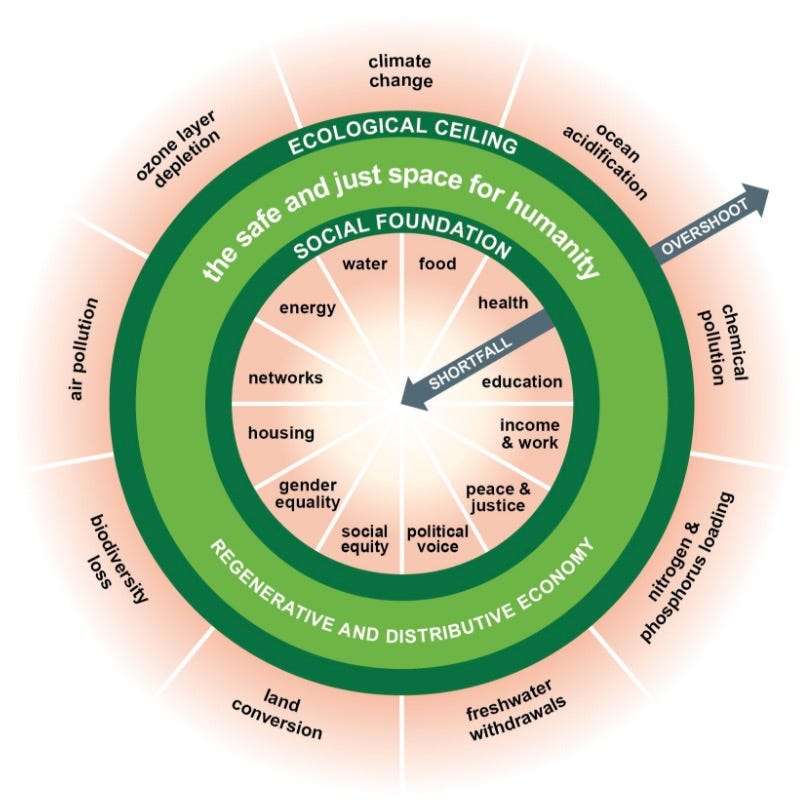 Doughnut Economics — @KateRaworth
Doughnut Economics — @KateRaworth
Okay.. sorry.. one last thought:
Maybe not all coins should not be exchangeable
We have a massive proliferation of new currencies at the moment. But how many do we NEED? There’s this big land-grab going on just like in the dot.com boom. It paid off for the winners. Amazon took 4% of ALL retail sales in the USA in 2017.
But like in the dot.com boom there were lots of online bookstores, but we only needed one winner to grow and bring more innovations to secure ongoing growth. But you have to be in it to win it, so hence lots of coins. Most of which will die or be amalgamated.
Perhaps we only really need, say, 12 coins to value everything. If £$€ can be broad enough to value canoes and cokes and shoes and houses, so we’ll maybe only need one for each of the category of thing £$€ doesn’t value. One for health, one for environment, and so on.
Perhaps we might make rules which say that you have to hold a positive balance on each of these 12 accounts for any one of them to work. You’re a human living in a public world on a finite planet, so part of the deal — part of the social contract — is that you have to make a positive contribution across all 12 areas. We do the same now: you’re basically screwed without a £$€ income because that’s how society currently values our individual contributions. Giving a broader criteria by which we’re valued allows for more human freedom, innovation, expression, and ways to exist.
Similarly in that social contract: sure you can take short-haul flights and eat lots of red meat but that will reduce your EcoCoin budget. And you can’t just buy your way out of it because you’re rich, because that’s just not fair on the rest of us. So we might say that each person is allowed to buy 5000 EcoCoin from someone else who doesn’t use theirs, but you can only transact 5000 per year, because otherwise everyone just buys EcoCoins, the rainforest burns, and we all die. This would entirely defeating the point, and we fail to graduate this level of the game.
So .. there you go. Bunch of ideas. What do you think? And do drop me a line if you want to go change (bits of) the world.
5 killer-apps to take blockchain mainstream, whilst civilising the planet. was originally published in Hacker Noon on Medium, where people are continuing the conversation by highlighting and responding to this story.
Disclaimer
The views and opinions expressed in this article are solely those of the authors and do not reflect the views of Bitcoin Insider. Every investment and trading move involves risk - this is especially true for cryptocurrencies given their volatility. We strongly advise our readers to conduct their own research when making a decision.
